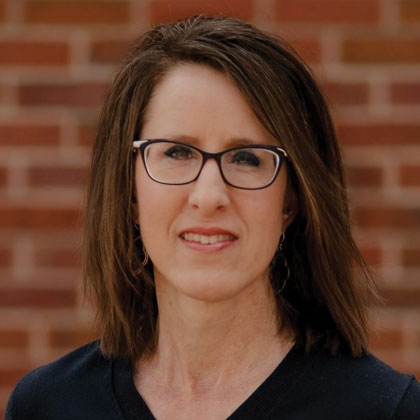Stories to Inspire
Still Upright

Debbie Oelke finds writing to be therapeutic, helping her to cope with the changes that occur with MS. In her new book, she chronicles the sudden onset of multiple sclerosis symptoms while balancing contentment with hope for healing – all from her viewpoint in a wheelchair. Debbie is a student of God’s word and loves to serve through teaching and hospitality. Even as her diverse background in small business, social work, and medical transcription took a turn when symptoms of MS began to impact her life, she has turned that struggle into yet another ministry. Debbie thoroughly enjoys small-town Kansas life with her husband and three children.
By Debbie Oelke
Disease progression is not welcome, predicted, or encouraging. Instead, it is difficult, random, and unrelenting. It is forever on my mind. Fear of the future is an hour-by-hour challenge to overcome.
I often wonder:
Will I be a burden to my family?
When will my physical care require specialized nursing?
How long will I be able to remain in my home?
I’m only forty-eight years old, but my life experience of adversity has matured me. Don’t mistake my tears for a lack of strength. My forbearance is relied upon every day.
When I received a multiple sclerosis diagnosis at the age of 25 in 1999, after two years of intermittent symptoms, I was not completely surprised. My grandmother had the disease in the 1950s and 60s, dying at the age of 39 from heart failure after needing to use a wheelchair for the last eleven years of her life.
Having to rely on a wheelchair was a terrifying thought. But during the next eighteen years of living with an MS diagnosis without disability and with very few symptoms, the scare became almost nonexistent.
Then June 2017 hit. It’s a time in my life I will never forget. Progression that seemed arbitrary began. I fast-forwarded through cane and four-wheeled walker stages, and then, because of worsening leg weakness, I graduated to a wheelchair. Gone were the hours spent typing for a part-time medical transcription job. Gone were the kayaking, half-marathon running, and jumping on the trampoline with my kids. Instead, I entered a world of bed rails and wheelchair-accessible ramps, seating, and restrooms. All of a sudden, handicapped parking, elevators, and grab bars were noted and mattered. I had to adjust to brushing my teeth and showering while sitting. I soon found out, besides my eight-inch makeup mirror, there was not a mirror in my house I could see into.
Disability wasn’t new to me as a trained school social worker, but it had never been personal. Now, it was. How was I going to attend my kids’ athletic games and school events? What about coffee dates with friends? Thankfully, my husband, children, and friends helped me make these desires a reality.
But then I often had to prepare for windy, extreme Kansas heat and rough terrain. After successfully navigating that hurdle, it became obvious that stares and unknowingly insensitive comments were difficult to ignore. As my very small community became accustomed to my sudden disability, I realized that putting my thoughts on paper was therapeutic for me.
My words tumbled out, and they turned into a book. It took six months to write a 256-page book, Still Standing: Hope Beyond Disability, which was published in late August 2022. An expression of my new normal was now public. My deepest feelings and fears were on display.
But the furthering of my disease continues amidst book publication excitement. A launch party, book signings, and selling out at a local fair are only temporary emotional relief.
Fear and wariness of what’s ahead loom on the periphery of my mind. Physical therapy exercises, activities intended to improve cognition, and even long-term care financial details now require my discernment. I find it’s best to stay distracted by other interests.
Though physically walking is not an option, I can still enjoy nature outside using my motorized wheelchair. Though spending long hours antique shopping is no longer doable, I can be grateful for friends who accompany me on short day trips to explore new places. Though spontaneously spending a weekend away is out of the question, I can be thankful for family members who purposely install safety bars in their own homes in order to encourage visits.
But my main distraction is also one of my biggest interests. Writing continues to be therapeutic. Though it does nothing to slow disease progression, it does everything to meet my emotional needs…my fear of withstanding yet another loss, such as the inability to pick my left foot off the ground, doesn’t stand a chance when I am distracted by wordsmithing.
It’s tempting to remain home and feel sorry for myself, but I refuse. I am determined to participate in activities as much as I possibly can. I have lost too much in the past five years. Whatever I am able to do, I will do it. My independence is now seen as a gift!
Having a husband who denies his own needs is unparalleled. Having three early adolescents who don’t remember a time their mom was not disabled is a blessing because life with a wheelchair is now quite natural for our family. But having a deep friendship with the God who made me and loves me is essential; it trumps even the hardest of days.
